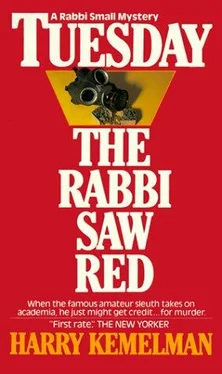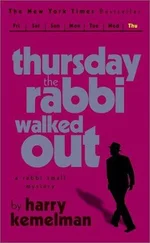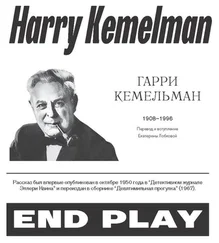"You think he's getting paid for it?"
"You kidding? Did you ever hear of a rabbi taking a job for nothing?"
"Well, all I can say is he's supposed to be working here full-time. So if he's getting paid, then bigod he ought to turn that money over to our treasury, same as if some engineer over at the GE works out some invention, he owes it to GE."
"Yeah, that'll be the day."
"Well, I think somebody ought to ask him."
"All right. I'll appoint you a committee of one."
"I don't mean me. But the president ought to, or the treasurer."
"Hell, they do it all the time. When they go off someplace to give a lecture, do they turn the money in? And some of these hotshot rabbis they do more talking outside the temple than in it."
"Some of the rabbi's sermons, I wouldn't mind if they were outside, to tell the truth."
They guffawed.
"It's not like it's someplace like Harvard or M.I.T.." said Norman Phillips, who was in the advertising business. "That would give the temple some prestige. But Windemere?" He emphasized his disparagement by swinging an imaginary golf club in a long approach shot to the green, although in his mid-forties. Norm was with it in the matter of clothes: two-tone fancy shoes, wide flared trousers worn low on the hips and supported by a heavy leather belt with a massive brass buckle. His long hair was not cut by a barber but shaped by a hair stylist. His opinions carried a certain weight with the other members of the board who assumed he knew what the young people of the community were thinking.
"What's wrong with Windemere?" demanded Malcolm Selzer belligerently. "My Abner goes there and he says it's a damn good school, he ought to know because his first year he was at Harvard and he likes Windemere better." Malcolm Selzer was definitely not with it clothes-wise. In the refrigerator business where you had to push heavy models around the sales floor, or even lend a hand to the boys loading the truck, it was hard enough just to keep your clothes clean and pressed.
"Wasn't your Abner's name in the paper the time they had the bombing there? I seem to remember him giving out some kind of statement from the student organization."
Malcolm Selzer nodded proudly. "That's right, he had nothing to do with it, of course, but he's a big shot in the student organization, meets with committees from the faculty and the administration, the kids these days, they're involved; not like in our time."
* * *
Miriam, the rabbi's wife, also had questions, she was tiny with a mass of blonde hair that seemed to overbalance her, she had wide blue eyes that gave her face a schoolgirl ingenuousness, but there was determination in the set of the mouth and in the small rounded chin. "Are you going to have any trouble with the board over this, David?"
"No. I don't think so. None that I can't handle."
"But won't it mean a lot of extra work?"
"Not really, maybe some quiz papers to correct every now and then. Preparing my lectures won't take much time."
She asked whether he was really keen on it, or was it just the money.
"Well, the extra money can be useful. It makes another trip to Israel possible."
"And a new rug for the living room?" she asked slyly.
He laughed. "And a new rug for the living room,” he agreed.
"Well, it will be a change of pace for you. I suppose. It's just that..,” she hesitated.
"What?"
"Well, knowing you. I know it's not the money at all. It's the teaching you're interested in, isn't it?"
"So?"
"So I just hope you won't be disappointed. Colleges and college students have changed a lot since you were in school, you know."
"Oh, I don't think so,” he said confidently, "not really."
Dean Hanbury swung her car sharply into an alley, drove down the narrow, muddy passageway behind two rows of apartment houses, made another sharp turn, and brought the car to rest against the wire-netting shielding some cellar windows.
"This is the school parking lot?" the rabbi asked in surprise. Dean Hanbury had suggested he ride with her to learn the way to the school.
"This is my parking spot,” she said, pointing to a small wooden sign that said "Dean Hanbury."
"At least it's been mine since we took over this apartment building a couple of years ago. I like it because on rainy days I can go through the back door and come out right across the street from the administration building."
They mounted the granite steps of the administration building, whose sandstone and red brick gave it an institutional look, all the other buildings resembled apartment houses. "This is the one and original building of the school,” she explained. "After we grew, we built on some vacant land and then over the years gradually acquired the apartment buildings between."
"These are all student dormitories?" he asked.
"Oh no, we remodeled them just as we're planning to do with the one across the way, there are still a couple of tenants on the top floor who've left but still have some of their furniture there, and oh yes. Professor Hendryx has an apartment on the first floor. But that was because when he joined us from down South, he just didn't have a place to live.
"She led him up wide stairs flanked by a massive mahogany balustrade. "You'll be sharing an office with him, by the way, the poor man doesn't know it yet, but I can't think of any other place to put you. Professor Hendryx is acting head of the English Department. I think you'll like him, he's originally from Barnard's Crossing, too. So you'll have something in common."
She unlocked her office. "My secretary has the week off between trimesters," she explained. "The place is like a morgue right now, but once classes start this building— the whole area— is simply mobbed. You'll be lucky to find a parking spot, that's important to remember, because your class is required to wait only eight minutes after the hour for you to appear, and believe me, come in after the eight minutes and they're gone." She shook her head. "I don't understand it, they don't go anyplace in particular; like as not they're sitting on the front steps, but they won't remain in the classroom even if they see you coming along the street, there's a kind of impatience among young people these days, although things have quieted down considerably in the last year or so, the change in the draft law probably had a great deal to do with it, we still get student agitation from time to time, of course, but nothing compared to '68 and '69, although there was a bombing last year. I'm sure you read about it in the papers."
"Yes, I remember."
"Our students weren't responsible. I'm sure,” she said quickly. "The police are fairly certain it was the work of outsiders— the Weathervane organization probably. Of course, some of our students could be members, well, if you'll excuse me. I'll see to the mail. But first let's see if President Macomber is free."
She spoke into the phone. "Ella? Dean Hanbury. Has President Macomber come in yet? Oh, I see, well, I'm in my office with Rabbi Small. You'll let me know, won't you?"
She hung up. "He's busy at the moment,” she said.
There was a knock on the half-open door, and a workman with a tool kit stuck his head in. "Professor Hendryx's office?"
"No." said Dean Hanbury. "It adjoins this one. I'm sure he's not in yet, though."
"That's all right, ma'am. I can start here, the order calls for cutting into your line." The man ran his eyes expertly along the telephone wire above the molding of the chair rail. It fed over the frame of the closet door, then along the picture molding. "You say his office is right on line with this one?"
"Yes—" A bump sounded from the other side of the wall. "Oh, he must have come in, after all,” she said. "Come along. Rabbi. I'll introduce you."
Читать дальше










